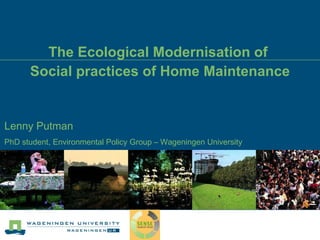Sense Epcem Presentation
- 1. The Ecological Modernisation of Social practices of Home Maintenance Lenny Putman PhD student, Environmental Policy Group â Wageningen University
- 2. Content Context of research Research goal and question Theoretical framework Research steps Practice of renovating the kitchen
- 3. Research context: Contrast Con sumption Tra nsitions for Su st ainability 5 consumption domains Rationale behind Contrast Need for a transition towards sustainability â sustainable housing Environmental change needs to involve the consumer - the consumer matters Social-technical context of consumption matters
- 4. Research goal and question Goal: to understand and theorise the role of occupants in changes towards sustainable housing Research question: how can we understand and describe the role of occupants in environmental changes in housing in the Netherlands?
- 5. Social Practices Approach Discursive & Practical consciousness Rules and Resources (virtual) Locale (material) l i f e s t y l e System of Provision Acquiring a house Renovating the kitchen Indoor Climate Management
- 6. Research steps Selection of environmental relevant practices Quick scan: System of provision, environmental aspects and innovations Consumer practices, environmental aspects and innovations Focus groups: providers and consumers Survey: Purchasing a house and renovating / DIY practices
- 7. Environmental relevance practice Environmental pressures of Production and provision of kitchens Process of renovation Kitchen based practices
- 8. Renovating a kitchen Mortgage / loan provider Kitchen retailer Builder / contractor Interior decorator/ architect DIY shop Appliances shops Home furnishing shops
- 9. SoP: routes of provision âkitchen providerâ % of number of kitchens 2003 2004 2005 2006 Kitchen retail 75% 79% 77% 73% Kitchen discounter 3% 4% 5% 5% DIY and building shop 7% 4% 5% 6% Home furnishing shop 6% 6% 6% 9% Other 9% 7% 7% 8%
- 10. Renovating the kitchen:SOP env. innovations 4 levels of innovations â modes of provision Kitchen as part of the house Integral kitchen provision Partial kitchen provision Updating
- 11. SoP: modes of provision Kitchen as part of the house Provision: entire kitchen renovation Provider: ? Consumer practice: consumer hiring interior decoratior, builder, kitchen provide
- 12. SoP: modes of provision Integral provision Provision: integral, taylor made Provider: furniture maker, kitchen retail Consumer practice: co-designing the kitchen Integral provision Integral provision Provision: integral Provider: kitchen retail Consumer practice: purchasing the kitchen Provision: integral Provider: kitchen retail, furnishing shops Consumer practice: purchasing and assembling
- 13. SoP: modes of provision Partial provision Provision: parts of the kitchen Provider: furnishingshops, DIY, appliances shops Consumer practice: design, gathering elements, and co-producer (assembling and diy)
- 14. SoP: modes of provision Provision: update part of the kitchen Provider: kitchen retail Consumer practice: purchasing a kitchen update Kitchen update
- 15. Renovating a kitchen: focusgroups Renovating the kitchen l i f e s t y l e System of Provision 1 2 3 4 5 5 6 3
- 16. More information??? Paper: www.enp.wur.nl/uk/staff/Lenny+Putman Email: [email_address]
















![More information??? Paper: www.enp.wur.nl/uk/staff/Lenny+Putman Email: [email_address]](https://image.slidesharecdn.com/senseepcempresentation-12557009616245-phpapp03/85/Sense-Epcem-Presentation-16-320.jpg)